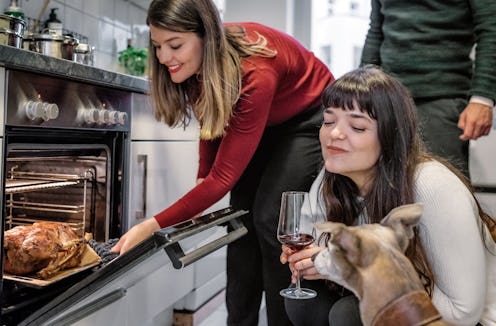Life
7 Festive Foods That You Shouldn't Be Sharing With Your Dog This Christmas

As festivities are under way, it's easy to get a bit fed up of all that food. No matter how much we fight it, we all hit that wall where enough is enough. And who better to help you out than your best friend, your constant companion, your little buddy. Our dogs are always eager to eat whatever's going, but, you guys, we have to be careful because there are actually quite a lot of Christmas food items you shouldn't feed your dog at risk of them getting sick. Or worse.
According to a survey conducted by Fetch, one in three Brits (35%) openly admit to feeding their pets bits of food directly from the dinner table. And who can blame them? The minute I see a pooch looking up at me with those sad eyes from underneath the dinner table all I want to do is tip my whole plate in their mouth. But certain foods — especially ones we eat around Christmastime — can be pretty toxic for dogs.
Yes, that's right, pet food company Canagan warns that there are a number of festive dishes to be concerned about sharing with your little pooch, no matter how eager they are to have a bite.
Here's your rundown of what NOT to feed Fido this Christmas.
1Turkey Bones
Give a dog a bone is a thing, right? Well, maybe in some cases, but turkey bones are actually very risky to feed to your pet. According to Canagan, the larger bones of a chicken, turkey, or goose pose a choking hazard. As well as this, the smaller pieces may irritate the gut. Guys, they could even manage to puncture the stomach wall, which may require surgery.
2Stuffing
I know what you're thinking: WTF?! Well guys, when it comes to that deliciously flavoursome stuffing, your dog shouldn't be allowed near it owing to one thing: alliums.
Sadly onions, shallots, garlic, leeks, and scallions all belong to the allium family, and they're off the menu for dogs. According to Canagan, the reason behind this is that the above plants contain a substance that harms dogs' red blood cells and can lead to all manner of ailments including diarrhea, weakness, and fatigue.
3Chocolate
OK, this one is probably the most obvious one, as everyone knows that chocolate is toxic to dogs, right?
Well, seemingly some people are under the impression that sugar-free chocolate is less offensive to the health of your pooch. But that's definitely not the case.
"Sugar-free chocolate is no better, as it’s artificially sweetened with xylitol, which also contains potentially fatal compounds. Ingestion of xylitol can lead to a rapid drop in blood sugar levels, which can lead to liver failure in some dogs," Canagan states.
4Nuts
The high fat content in nuts can cause vomiting and diarrhea in your little baby pup. As well as this, there are strict instructions from Canagan to "never feed your pup macadamia nuts or black walnuts."
5Christmas Pudding, Christmas Cake, & Mince Pies
Booze-laden puddings do nothing good for your pooch, nor do those filled with sugar and fat. Also the raisins, currants, and sultanas in fruity festive favourites like mince pies, Christmas cake, and Christmas pudding are poisonous to dogs.
So maybe pop down Sainsbury's and grab a packet of their dog-friendly mince pies? Just make sure you don't accidentally eat one. They look scarily similar to the human-friendly ones.
6Blue Cheese
Put the cheese down and step away from the dog. You heard me. Blue cheeses like Stilton, Roquefort, or Cashel Blue contain a fungus harbouring a substance called roquefortine C. In extreme cases, dogs can develop gnarley muscle tremors and seizures lasting up to two days as a result of ingesting it.
7Bread Sauce
I know, I'm shook too. This issue is down to your alliums again.
8
Make sure Christmas is happy for you all, especially your pups, because seeing them poorly would definitely put a dampener on the proceedings.
This article was originally published on